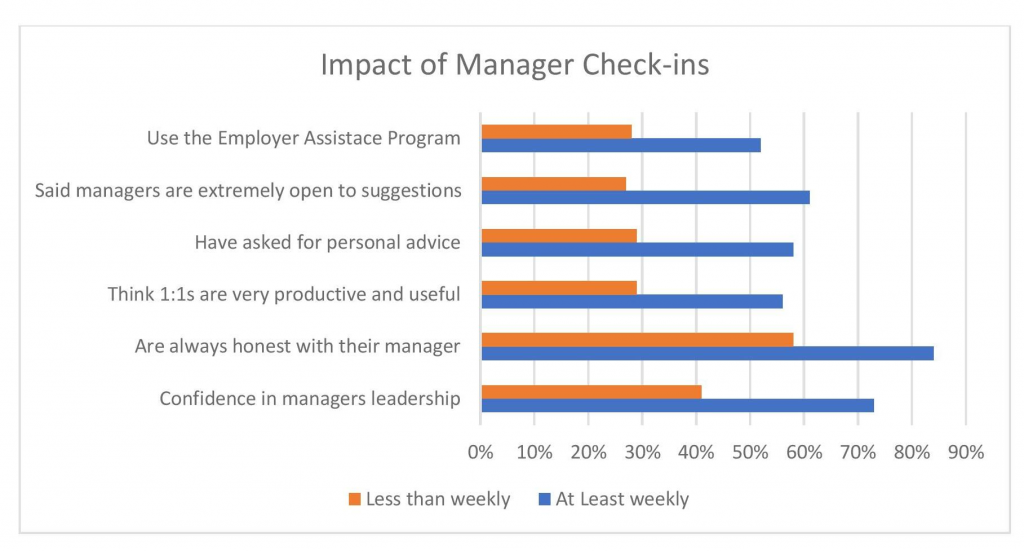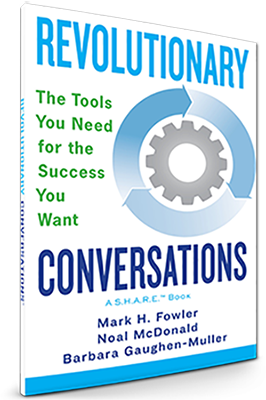Time to integrate life and work
To say that we now live in an exceptionally stressful time is an understatement. With a pandemic, political and social unrest, disruptions in our work and home life and catastrophic weather events all at once – it’s no wonder that a Mind Share Partners survey of employees in March/April 2020 found a 42% increase in mental health issues among respondents. We’ve all become aware of our own emotional challenges as we cope with our current situations. As leaders, we are also aware of how our employees are coping and how anxiety, fear and stress impact everyone’s performance and engagement.
Through this “new normal” experience, we are learning that we cannot separate people’s lives from their work. The old work paradigm of leaving your personal life outside the door when you come to work is impossible to support now that the lines between work and home have become blurred with technology. Millennials and Gen Z see work and life as interconnected, both part of their personal goals for development and experience. We are changing our views of what people need to thrive. We are learning that the well-being of everyone is key to organizational success.
For some context about how important this is, a survey of 1000 U.S. workers and 500 managers by 15Five found that 90% of workers said they performed better “when their company supports their emotional wellness.” Managers agree, with 94% of them responding that the emotional wellness of their employees is as important as their performance. These statistics point to a need for a significant cultural change.
MANAGERS – ON FRONT LINE OF CHANGE
Our managers will be at the forefront of this cultural change. We’re asking managers to engage in entirely new kinds of conversations that include mental health and well-being. To help get started, here are 4 ideas to begin changing conversational dynamics.
Initiate frequent check-ins with your team
Make these connection points a priority. Work on including “personal” time in conversation. It’s even more important now to maintain contact as so many of us may be working from home and feeling isolated. Add all the other emotional challenges of our world today and that means we must redouble our efforts to stay in touch.
Frequency of contact is important. As the 15Five survey shows, frequent and consistent one-on-ones create strong, trusting relationships.

15Five – The Next Generation Workplace – Supporting Employees as Competitive Advantage
The survey also reports that “50% of employees who have productive and useful 1:1s plan to stay at their organizations for 5 or more years.” Pretty powerful retention tool!
Acknowledge vulnerability
To connect, leaders know they need to be honest and share some of their challenges. In the face of the pandemic, if managers can share some of fears, concerns and challenges, it makes it ok for the rest of the team to do the same. Use questions that stimulate conversations. “How are you? I’m fine” does not constitute a conversation. How about opening a conversation with a team member with “I’m feeling a little stressed about…. Do you ever feel that way?” It opens the door to finding out how they feel. Managers have to go first so people know it’s ok to talk about emotions. It’s a way to open a conversation that helps build trust through common ground.
Be a mental-health role model
We want our team members to take care of themselves. We say we’re flexible. We want people to do things to support their well-being, but our old culture may send a different message. Managers can take the lead by controlling their own schedule, refraining from emailing people at all hours, taking time off – even if it is only for a day – to rest and regenerate. Our teams won’t be comfortable doing things for their own well-being if management is still in the old mode.
Show gratitude & kindness
A genuine thank you is easy and the impact can be dramatic. All of us want to feel appreciated and acknowledged for what we contribute. Especially with the extra challenges today, appreciation and kindness can reduce stress and improve productivity. Once you start, others will naturally follow and the culture will begin to reflect this new mindset.
ORGANIZATIONAL COMMITMENT TO WELL-BEING
Including well-being in our culture requires a mind-set change. Executives and Human Resources leaders can help people embrace change by integrating it into larger organizational processes.
Enhance education & training
Create a broad-based training curriculum to include a new level of communication skills, mental health and wellness awareness and education programs, Emotional Intelligence or similar workshops, self-awareness assessments and training to help build stronger understanding between co-workers and teams.
Make your Employee Assistance Program easy to access. Teach people how to use it and continually promote all services available. Find champions for the program at every level.
Retool policies to support well-being
Many organizations have already looked at flexible hours, paid time off and expanded leave policies. Continue to fine tune these with an eye to a different kind of culture. Think about the performance evaluation process and build in more opportunity to discuss personal well-being and growth. Connect the dots to performance and collaborate on plans to support the whole person.
Track progress
Instead of an annual engagement/satisfaction survey, consider using pulse surveys. These will give quick, real-time information about the organization that can be used to course-correct or add new ideas. Include questions about well-being – How are you coping? What could help you? What resources do you need? These surveys are another touch-point that demonstrates that the organization is interested and focused on the well-being of all their members.
Away we go into the future…
So many things have changed for all of us over the last 8 months. We have all been challenged like never before. We’ve learned how interdependent we are and how much stress, anxiety and fear we all have. We are learning to see and honor people for all aspects of their lives – we’ve seen their home offices, the kids and the dogs and cats. Now it’s time to bring our mutual well-being to the forefront of our organizations. When well-being is a part of our culture, we help our people integrate all aspects of their lives to be the best they can be at work and at life.
Copyright © 2020 Revolutionary Conversations, LLC. All Rights Reserved
REVOLUTIONARY CONVERSATIONS

Now, possibly more than ever in our history, we need to focus on communication – how we have conversations that move us forward — even when we are stressed beyond belief. Revolutionary Conversations™ and the S.H.A.R.E.™ Tools will give you a platform to develop soft skills and a roadmap to navigate any conversation. From the shop floor to the board room, from the office to the living room, these simple, elegant Tools, will help you build consensus and solve problems, create effective teams, increase engagement with employees, family and friends.
Buy it today and put it to work now!


